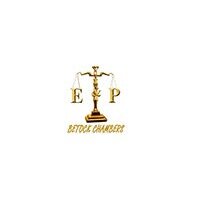Best Nursing Home Abuse Lawyers in Sierra Leone
Share your needs with us, get contacted by law firms.
Free. Takes 2 min.
Or refine your search by selecting a city:
List of the best lawyers in Sierra Leone
About Nursing Home Abuse Law in Sierra Leone
Nursing home abuse in Sierra Leone refers to any mistreatment, neglect, or harm inflicted on residents of nursing homes or care facilities. This can include physical, emotional, financial, or sexual abuse. It is essential to understand your legal rights and options if you suspect abuse or neglect in a nursing home.
Why You May Need a Lawyer
You may need a lawyer in cases of nursing home abuse to help you navigate the legal system, gather evidence, and file a lawsuit against the responsible parties. Lawyers can also negotiate settlements on your behalf and ensure that your rights are protected throughout the legal process.
Local Laws Overview
In Sierra Leone, nursing home abuse laws are primarily governed by the Nursing and Midwifery Act of 2019. This legislation outlines the standards of care that nursing homes must adhere to and establishes guidelines for reporting and investigating abuse cases. Victims of nursing home abuse have the right to seek compensation for damages and hold accountable those responsible for the abuse.
Frequently Asked Questions
1. What are the signs of nursing home abuse?
Signs of nursing home abuse can include unexplained injuries, sudden changes in behavior, poor hygiene, and financial exploitation.
2. How can I report nursing home abuse in Sierra Leone?
You can report nursing home abuse to the Ministry of Social Welfare, Gender, and Children's Affairs or seek legal advice from a lawyer specializing in nursing home abuse cases.
3. Can I sue a nursing home for abuse?
Yes, you can file a lawsuit against a nursing home for abuse if you or a loved one has been a victim of mistreatment or neglect.
4. What compensation can I receive for nursing home abuse?
Compensation for nursing home abuse may include medical expenses, pain and suffering, and punitive damages for the negligent actions of the facility.
5. How long do I have to file a lawsuit for nursing home abuse?
The statute of limitations for nursing home abuse cases in Sierra Leone is typically two years from the date of the incident. It is crucial to consult with a lawyer promptly to ensure your legal rights are protected.
6. Can I remain anonymous when reporting nursing home abuse?
Yes, you can choose to remain anonymous when reporting nursing home abuse to protect your privacy and safety.
7. What steps should I take if I suspect nursing home abuse?
If you suspect nursing home abuse, document any evidence, report your concerns to the appropriate authorities, and seek legal advice from a qualified attorney.
8. How can I find a lawyer specializing in nursing home abuse cases in Sierra Leone?
You can ask for recommendations from trusted sources, search online legal directories, or contact the Sierra Leone Bar Association for referrals to reputable lawyers in this field.
9. What are the potential consequences for nursing home staff found guilty of abuse?
Nursing home staff found guilty of abuse may face criminal charges, termination from their employment, and civil lawsuits for damages caused to residents.
10. How can I protect my loved ones from nursing home abuse?
To protect your loved ones from nursing home abuse, visit them regularly, communicate openly with the staff, and be vigilant for any signs of mistreatment or neglect.
Additional Resources
For more information on nursing home abuse in Sierra Leone, you can contact the Sierra Leone Nursing and Midwifery Board or seek assistance from local advocacy groups such as HelpAge International.
Next Steps
If you believe you or a loved one has been a victim of nursing home abuse in Sierra Leone, it is essential to seek legal advice promptly. Contact a reputable lawyer specializing in nursing home abuse cases to discuss your rights, options, and how to proceed with a legal claim.
Lawzana helps you find the best lawyers and law firms in Sierra Leone through a curated and pre-screened list of qualified legal professionals. Our platform offers rankings and detailed profiles of attorneys and law firms, allowing you to compare based on practice areas, including Nursing Home Abuse, experience, and client feedback.
Each profile includes a description of the firm's areas of practice, client reviews, team members and partners, year of establishment, spoken languages, office locations, contact information, social media presence, and any published articles or resources. Most firms on our platform speak English and are experienced in both local and international legal matters.
Get a quote from top-rated law firms in Sierra Leone — quickly, securely, and without unnecessary hassle.
Disclaimer:
The information provided on this page is for general informational purposes only and does not constitute legal advice. While we strive to ensure the accuracy and relevance of the content, legal information may change over time, and interpretations of the law can vary. You should always consult with a qualified legal professional for advice specific to your situation.
We disclaim all liability for actions taken or not taken based on the content of this page. If you believe any information is incorrect or outdated, please contact us, and we will review and update it where appropriate.
Browse nursing home abuse law firms by city in Sierra Leone
Refine your search by selecting a city.








